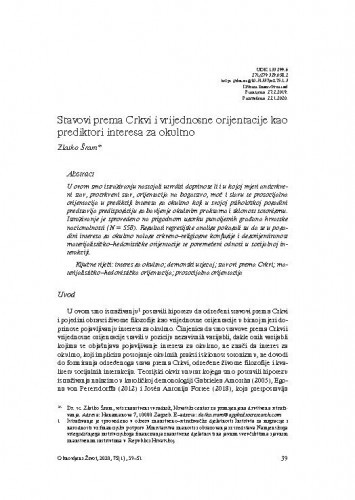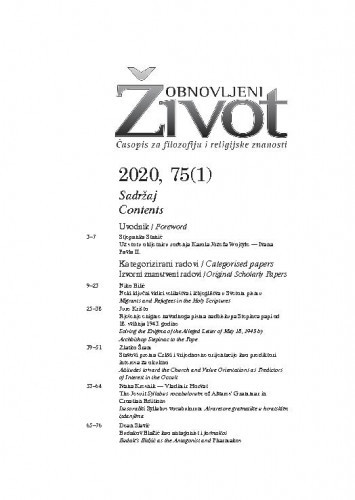U ovom smo istraživanju nastojali utvrditi doprinose li i u kojoj mjeri anticrkveni stav, procrkveni stav, orijentacija na bogatstvo, moć i slavu te prosocijalna orijentacija u predikciji interesa za okultno koji u svojoj psihološkoj pozadini predstavlja predispoziciju za bavljenje okultnim praksama i sklonost sotonizmu. Istraživanje je sprovedeno na prigodnom uzorku punoljetnih građana hrvatske nacionalnosti (N = 558). Rezultati regresijske analize pokazali su da se u pozadini interesa za okultno nalaze crkveno–religiozne konfuzije i dezorijentiranost materijalističko hedonističke orijentacije te poremećeni odnosi u socijalnoj interakciji.; The aim of this research was to determine whether and to what degree an anti Church attitude, a pro–Church attitude, value orientation to wealth, power, and glory and prosocial value orientation contribute to the prediction of an interest in occult practices and satanism. The survey was carried out on a sample of Croatian citizens (N=558) in eastern Croatia. Factor analysis was performed to establish the construct validity of all measures applied in this survey. The results of multiple regression analysis revealed that a conflicting attitude towards the Church, i.e. the simultaneous existence of both anti–Church and pro–Church attitudes, and the value orientation to wealth, power, and glory underlie an interest in the occult, whereas a prosocial value orientation pointed in a negative direction away from an interest in the occult. It was discovered that a Church–religious severe attitudinal and perceptual confusion and disorientation, a longing for a materialistic hedonistic life–style, and disordered relations in social interactions underlie an interest in occult practices and satanism. Such Church religious cognitive dissonance may motivate individuals to dabble in the occult in an effort to reduce the psychological discomfort and tension that any cognitive dissonance produces. However, an interest in th e occult may generate a Church–religious cognitive dissociation as the possible result of demonic influence, leading some of the faithful to "diabolic confusion".
Sažetak

 Obnovljeni život : časopis za religioznu kulturu : 75, 1(2020) / glavni urednik Tadija Milikić.
Obnovljeni život : časopis za religioznu kulturu : 75, 1(2020) / glavni urednik Tadija Milikić.